About THE NEGOTIABLE INSTRUMENTS ACT |
| CHAPTER I Preliminary 1 Short title, local extent, saving of usages relating to hundis, etc. Commencement 2 Repeal of enactments (Repealed) 3 Interpretation clause “Banker” CHAPTER II Of notes, bills and cheques 4 “Promissory note” 5 “Bill of Exchange” 6 “Cheque” 7 “Drawer”, “Drawee”, “Drawee in case of need”, “Acceptor”, “Acceptor for honour”, “Payee” 8 “Holder” 9 “Holder in due course” 10 “Payment in due course” 11 Inland instrument 12 Foreign instrument 13 Negotiable instrument 14 Negotiation 15 Indorsement 16 Indorsement “in blank” and “in full”, “indorsee” 17 Ambiguous instruments 18 Where amount is stated differently in figures and words 19 Instruments payable on demand 20 Inchoate stamped instruments 21 “At Sight”, “On Presentment”, “After Sight” 22 “Maturity” Days of grace 23 Calculating maturity of bill or note payable so many months after date or sight 24 Calculating maturity of bill or note payable so many days after date or sight 25 When day of maturity is a holiday CHAPTER III Parties to Notes, Bills and Cheques 26 Capacity to make, etc., promissory notes, etc. 27 Agency 28 Liability of agent signing 29 Liability of legal representative signing 30 Liability of drawer 31 Liability of drawee of cheque 32 Liability of maker of note and acceptor of bill 33 Only drawee can be acceptor except in need or for honour 34 Acceptance by several drawees not partners 35 Liability of indorser 36 Liability of prior parties to holder in due course 37 Maker, drawer and acceptor principals 38 Prior party a principal in respect of each subsequent party 39 Suretyship 40 Discharge of indorser’s liability 41 Acceptor bound although indorsement forged 42 Acceptance of bill drawn in fictitious name 43 Negotiable instrument made, etc., without consideration 44 Partial absence or failure of money consideration 45 Partial failure of consideration not consisting of money 45A Holder’s right to duplicate of lost bill CHAPTER IV Of Negotiation 46 Delivery 47 Negotiation by delivery 48 Negotiation by indorsement 49 Conversion of indorsement in blank into indorsement in full 50 Effect of indorsement 51 Who may negotiate 52 Indorser who excludes his own liability or makes it conditional 53 Holder deriving title from holder in due course 54 Instrument indorsed in blank 55 Conversion of indorsement in blank into indorsement in full 56 Indorsement for part of sum due 57 Legal representative cannot by delivery only negotiate instrument indorsed by deceased 58 Instrument obtained by unlawful means or for unlawful consideration 59 Instrument acquired after dishonour or when overdue, Accommodation note or bill 60 Instrument negotiable till payment or satisfaction CHAPTER V Of Presentment 61 Presentment for acceptance 62 Presentment of promissory note for sight 63 Drawee’s time for deliberation 64 Presentment for payment 65 Hours for presentment 66 Presentment for payment of instrument payable after date or sight 67 Presentment for payment of promissory note payable by instalments 68 Presentment for payment of instrument payable at specified place and not elsewhere 69 Instrument payable at specified place 70 Presentment where no exclusive place specified 71 Presentment when maker, etc., has no known place of business or residence 72 Presentment of cheque to charge drawer 73 Presentment of cheque to charge any other person 74 Presentment of instrument payable on demand 75 Presentment by or to agent, representative of deceased or assignee of insolvent 75A Excuse for delay in presentment for acceptance or payment 76 When presentment unnecessary 77 Liability of banker for negligently dealing with bill presented for payment CHAPTER VI Of Payment and Interest 78 To whom payment should be made 79 Interest when rate specified 80 Interest when no rate specified 81 Delivery of instrument on payment or indemnity in case of loss CHAPTER VII Of discharge from liability on Notes, Bills and Cheques 82 Discharge from liability — (a) by cancellation; (b) by release; (c) by payment 83 Discharge by allowing drawee more than forty-eight hours to accept 84 When cheque not duly presented and drawer damaged thereby 85 Cheque payable to order 85A Drafts drawn by one branch of a bank on another payable to order 86 Parties not consenting discharged by qualified or limited acceptance 87 Effect of material alteration, Alteration by indorsee 88 Acceptor or indorser bound notwithstanding previous alteration 89 Payment of instrument on which alteration is not apparent 90 Extinguishment of rights of action on bill in acceptor’s hands CHAPTER VIII Of Notice of Dishonour 91 Dishonour by non-acceptance 92 Dishonour by non-payment 93 By and to whom notice should be given 94 Mode in which notice may be given 95 Party receiving must transmit notice of dishonour 96 Agent for presentment 97 When party to whom notice given is dead 98 When notice of dishonour is unnecessary CHAPTER IX Of Noting and Protest 99 Noting 100 Protest, Protest for better security 101 Contents of protest 102 Notice of protest 103 Protest for non-payment after dishonour by non-acceptance 104 Protest of foreign bills 104A When noting equivalent to protest CHAPTER X Of reasonable time 105 Reasonable time 106 Reasonable time of giving notice of dishonour 107 Reasonable time for transmitting such notice CHAPTER XI Of acceptance and payment for honour and reference in case of need 108 Acceptance for honour 109 How acceptance for honour must be made 110 Acceptance not specifying for whose honour it is made 111 Liability of acceptor for honour 112 When acceptor for honour may be charged 113 Payment for honour 114 Right of payer for honour 115 Drawee in case of need 116 Acceptance and payment without protest CHAPTER XII Of compensation 117 Rules as to compensation CHAPTER XIII Special rules of evidence 118 Presumptions as to negotiable instruments — (a) of consideration; (b) as to date; (c) as to time of acceptance; (d) as to time of transfer; (e) as to order of indorsement; (f) as to stamps; (g) that holder is a holder in due course 119 Presumption on proof of protest 120 Estoppel against denying original validity of instrument 121 Estoppel against denying capacity of payee to indorse 122 Estoppel against denying signature or capacity of prior party CHAPTER XIV Of crossed cheques 123 Cheque crossed generally 124 Cheque crossed specially 125 Crossing after issue 126 Payment of cheque crossed generally, Payment of cheque crossed specially 127 Payment of cheque crossed specially more than once 128 Payment in due course of crossed cheque 129 Payment of crossed cheque out of due course 130 Cheque bearing “not negotiable” 131 Non-liability of banker receiving payment of cheque 131A Application of chapter to drafts CHAPTER XV Of bills in sets 132 Set of bills 133 Holder of first acquired part entitled to all CHAPTER XVI Of international law 134 Law governing liability of maker, acceptor or indorser of foreign instrument 135 Law of place of payment governs dishonour 136 Instrument made, etc, out of India but in accordance with the law of India 137 Presumption as to foreign law CHAPTER XVII Of penalties in case of dishonour of certain cheques for insufficiency of funds in the accounts 138 Dishonour of cheque for insufficiency, etc, of funds in the account 1 Competence of the Parliament 2 Statement of objects and reasons 3 Object 4 Salient features 5 Non- compliance with the provision 6 Scope 7 Nature 8 Applicability 9 Applicability of provisions to cheques issued before 1-4-1989 10 Issue of cheque is not an offence 11 Ingredients of the offence 12 Dishonour of cheque issued for discharge of legally enforceable debt/liability 13 Section 138 and Criminal Law 14 Power of courts 15 Interference by High Court in disputed questions of fact 16 Bailable offence 17 Trial of offence: Summary procedure 18 Directions for Summary Trial 19 Defence evidence 20 Month’, meaning of 21 Presentation of cheques any number of times during validity period 22 Filing of a civil suit 23 Arbitration proceedings 24 Prosecution for cheating: Not barred 25 Prosecution based on successive dishonour of cheque 26 Filing of a complaint 27 Condonation of delay in filing complaint 28 Place of filing complaint 29 Locus standi to file complaint 30 Verification of complaint 31 Cause of action 32 Complaint not signed by complainant 33 Permissibility for the substitution of complainant 34 Deficit Court Fee 35 Sole proprietorship concern 36 Complaint by company 37 Delegation of power of attorney 38 Power of Attorney to witness transaction 39 Complaint by Power of Attorney Holder 40 Complaint, maintainability 41 Reasons for return 42 ‘Refer to drawer’, meaning of 43 ‘Such person shall be deemed to have committed an offence’ 44 Payment of cheque stopped by drawer 45 Propriety of order of issue process 46 Bank account closed 47 Exceeds arrangement: Dishonour on ground of 48 Insufficient balance 49 Cheque reported stolen 50 Alteration in date and drawer’s signature differs 51 Drawer’s signature incomplete 52 Drawer’s signature denial 53 Recourse to Proceedings 54 Making endorsement ‘sans recourse’ on cheque 55 Bank documents: Admissibility in evidence 56 Exclusion of mens rea 57 Cheque drawn by a person 58 Cheque issued in illegal transaction 59 Liability of director 60 Liability of drawer of cheque 61 Cheque issued by authorised signatory: Liability 62 Vicarious liability 63 Cheque issued by mandate holder: Liability 64 Forfeiture of right of holder/payee 65 Self drawn cheque 66 Pay Order, dishonour of 67 Post-dated cheques, dishonour of, effect 68 An account maintained with a banker 69 Joint bank account operated by ‘Either or Survivor’: Liability 70 Banker 71 Undated cheque 72 Any debt or other liability: Legally enforceable liability 73 Debt/Liability: Proof of 74 Existence of debt or liability on the date of cheque 75 Time-barred debt 76 Discharge of liability in excess of liability incurred 77 Legally enforceable liability 78 Burden of proof 79 Presumption 80 Modification of discharge of liability 81 Part payment 82 Other liabilities 83 Cheque received as guarantee or security 84 Chit funds 85 Uncertain future liabilities 86 Proceedings against guarantor: Maintainable 87 Blank cheque issued as security 88 Misuse of blank cheque: Expert opinion 89 Cheque issued as collateral security 90 Liability need not be of drawer 91 Discharge of debt of wife 92 Discharge of Debt of Father 93 Death of drawer of cheque 94 Holder in due course 95 Drawer alone can be prosecuted 96 Cheque discounting facility with bank: Liability 97 Offence 98 Failure’ to make payment 99 Cognizance of offence 100 Quashing of Cognizance 101 Without prejudice to any other provision of this Act 102 Material alterations in cheque 103 Typographical error 104 Clubbing of complaints 105 Punishment (a)Prior to 6-2-2003 (b)On and from 6-2-2003 106 Sentences to run concurrently: Powers of Court 107 Sentence of imprisonment till rising of court 108 Suspension of sentence 109 Penalty provision created by legal fiction 110 Provision, not for compensation 111 Compensation 112 Mode of recovery of fine and compensation 113 Compensation, reduced 114 Sentence of fine and compensation 115 Inadequacy of sentence 116 Payment of interest on award of compensation 117 Default sentence 118 Compounding of offence 119 Acquittal 120 Propriety of order of acquittal 121 Conviction 122 Release on probation 123 Pendency of parallel proceedings 124 Lok adalats 125 Presentation of cheque 126 Territorial jurisdiction 127 Transfer of cases 128 Compliance of procedure of trial on transfer of a Magistrate 129 Provisos (1) Period for presentment: clause (a) (2) Notice of demand for payment: clause (b) 130 Issuance of notice 131 Handwritten notice 132 Construction of Proviso 133 Demand notice: Limitation period 134 Notice to company sufficient 135 Notice to director itself 136 Form or format of notice 137 Permissibility for the use of printed format 138 Notice not signed by Advocate: Validity 139 Contents of notice 140 Notice sent under certificate of posting 141 Notice: Service of 142 Fresh notice 143 Constructive service of notice 144 Deemed service of notice 145 Demand notice sent by registered post 146 Demand notice: Burden of proof of service 147 Copy of demand notice: Admissibility 148 Omnibus Demand in Notice 149 Period for payment 150 Date of service of statutory notice 151 Period for filing of complaint 152 Computation of period of limitation of notice 153 Computation of period of one month for filing of complaint 154 Extension of limitation period 155 Averment in complaint 156 “Date of receipt” to be understood as “date of knowledge of receipt” of the notice 157 Proof of service of demand notice 158 Receipt of notice by wife of accused drawer 159 Notice, interpretation of 160 Validity of demand notice 161 Exact date of issue of notice or date of service of the notice in the complaint 162 Words ‘said amount of money’, meaning 163 Notice of demand: Cheque Number 164 Dishonour of cheque for higher amount 165 Prior discharge 166 Consolidated notice for more than one cheques: Validity 167 Premature complaint 168 Subsequent events: Consequence of part payment by drawer after issue of notice 169 Deposit by accused of entire amount during trial 170 Single complaint in respect of more than one dishonoured cheque 171 Summoning of accused 172 Examination of complainant 173 Production of additional evidence 174 Examination of witnesses 175 Dismissal of complaint 176 Dismissal of complaint for non-appearance of complainant/counsel 177 Personal attendance of accused 178 Death of payee 179 Death of drawer 180 Death of drawer-partner 181 Death of complainant 182 Discharge of accused 183 Non-mention of necessary ingredients in pre-summoning statement 184 No grant of injunction 185 Private complaint by accused: Maintainability 186 Drawer declared insolvent 187 Delay in disposal of cases: Practice and procedure 188 Additional evidence: Permissibility 189 Quashing of complaint 190 Quashing of proceedings 191 Propriety of non-consideration of issue of limitation 192 Writ jurisdiction of High Court 193 Nature and extent of presumption: Standard of proof 194 Rejection of application for sending cheque to FSL 195 Money lending transaction 196 Application for Opinion of handwriting export 197 Preponderance of probabilities 198 Power of successor Magistrate 199 Revision, scope 200 Remand of case 201 Instruction, while working abroad 202 Filing of case against directors 203 Cheques whether supported by consideration 139 Presumption in favour of holder 1 Presumption against the drawer, 2 Scope 3 Termination of dealership due to dishonour of cheque 4 Nature and extent of presumption 5 Shall be presumed 6 Propriety of presumption 7 Unless the contrary is proved 8 Rebuttal evidence: Quantum of 9 Holder of a cheque as referred to in section 138 10 Rebuttal plea 11 Non-rebuttal of presumption 12 Presumption available to payee and holder 13 Discharge in whole or in part of any debt or other liability 14 Presumption of existence of legally enforceable debt 140 Defence which may not be allowed in any prosecution under section 138 1 Scope 2 Exclusion of mens rea 3 It shall not be 4 Reason to believe 5 ‘Issuance’ of cheque 6 Cheque may be dishonoured on presentation 7 Closure of account prior to date of drawal of cheque 141 Offences by companies 1 Offences by companies 2 Non-banking financial companies 3 Scope 4 “At the time the offence was committed”, scope of 5 Complaint, maintainability 6 Non-incorporation of particulars 7 Reliance on affidavit 8 Validity 9 Expression ‘Company’: Meaning and scope 10 Expression “other association of individuals” 11 Status of a sole proprietorship concern 12 Liabilities of a firm and its partners 13 Joint family business 14 Legal liabilities of a company 15 Trustees of a trust 16 Hindu Undivided Family (HUF) 17 Section 141, sub-section (1) (a)Every person incharge (b)Vicarious liability (c)Quashing of prosecution (d)As well as the company 18 Post-dated cheques 19 Demand notice 20 Section 141 — First proviso — Meaning of 21 Nominated directors not liable for prosecution — Second proviso 22 Section 141(2): With the consent or connivance of, or is attributable to, any neglect on the part of 23 Section 141(2): Director — Manager or other officer — Meaning of 24 Vacation of office: Quashing of prosecution 25 Vicarious liability: Prosecution of Director: Sustainability 26 Winding up proceedings pending 27 Explanation (b) 28 Company not prosecuted 29 Proceeding against company and its Managing Director 30 Companies under winding up 31 Sick industrial companies 32 Duty of Courts: Frivolous litigation 33 Company changing name 142 Cognizance of offences 1 Scope 2 Proviso differs prosecution 3 Notwithstanding anything contained in Code of Criminal Procedure 4 Filing of complaint: Legal requirements 5 Cognizance of the offence: Section 142(1)(a) 6 Complaint by payee or holder in due course 7 Fresh complaint remedy 8 Complaint by company 9 Complaint by co-operative society 10 Complaint by Government Company 11 Sole proprietorship firm 12 Partnership firm 13 Complaint by unregistered firm 14 Limitation for taking cognizance 15 Cheques issued in favour of bank 16 Complaint in writing: Section 142(1)(b) 17 Issuing of fresh demand notice 18 Complaint filed by power of attorney holder 19 Ingredients of offence 20 Complaint filed by advocate 21 Complaint sent by post 22 “Within one month of the date on which the cause of action arises” 23 Quashing of prosecution 24 Sufficient cause for not making a complaint within time 25 Amendment prospective, not retrospective 26 Premature complaint 27 Jurisdiction of the court: Section 142(1)(c) 28 Cause of action 29 Defective notice 30 Question of limitation (a)With effect from 6-2-2003 (b)Prior to 6-2-2003 31 Prospective operation 32 Successive presentation of cheque: Cause of action: Computation of 33 Importance of date seal of court on copy of complaint to be served on accused 34 Magistrate cannot refer the complaint to police for investigation 35 Nature of enquiry before issue of process 36 Recommended procedure for trial of section 138 complaint 37 Non-applicability of section 29(2) of the Cr PC 38 When punishment more severe than Magistrate empowered to give warranted 39 Power of Court 40 Power of attorney holder 41 Territorial jurisdiction settled by the insertion of section 142(2) 142A Validation for transfer of pending cases 143 Power of Court to try cases summarily 1 Trial of offence: Summary procedure 2 Summary trial of cases 3 Recording of reasons: Requirement of 4 Summary trial provisions under the Code of Criminal Procedure 5 Sentence of imprisonment or fine 6 When the Magistrate may not hold a summary trial 7 Day to day trial 8 Trials to conclude within six months 9 Directions to courts, for speedy disposal of dishonour of cheque cases 144 Mode of service of summons 145 Evidence on affidavit 1 Evidence on affidavit 2 Section 145 not to be dissected into pre-summoning and post-summoning stage of trial 3 Section 145 is an enabling provision 4 Scope and nature of provision: Overriding effect 5 Right to fair trial 6 Amendment retrospective or prospective 7 Territorial jurisdiction 146 Bank’s slip prima facie evidence of certain facts 147 Offences to be compoundable 1 Compounding of offence 2 Right of accused to tender his evidence on affidavit 3 Procedure to be followed: Applicability of section 320, Cr PC 4 Permission from Court 5 Deposit of ‘Amount due’ in Court 6 Mere compromise and an action of compounding a crime: Distinction Annexure 1 Specimen Notices SPECIMEN 1 Proforma of a notice in connection with payment of arrears of salary SPECIMEN 2 Proforma of a notice in connection with rendering services SPECIMEN 3 Proforma of a notice on behalf of a business firm for the amount outstanding on account of supply of goods SPECIMEN 4 Proforma of a notice on behalf of the supplier of goods SPECIMEN 5 Proforma of a notice on account of purchases made on credit SPECIMEN 6 Proforma of a notice on behalf of a Bank SPECIMEN 7 Proforma of a notice on behalf of a company SPECIMEN 8 Proforma of a notice on behalf of a Pvt. Ltd. Company to a Limited Company on account of non-payment for the supply of goods Annexure 2 Specimen Complaints SPECIMEN 1 Proforma of a complaint for supply of goods on credit SPECIMEN 2 Proforma of a complaint on behalf of a sole proprietorship concern SPECIMEN 3 Proforma of a complaint on behalf of a Pvt. Ltd. Co. against a Limited Company SPECIMEN 4 Proforma of a complaint by a leasing company SPECIMEN 5 Proforma of a complaint on behalf of a Ltd. Company against another Ltd. Company SPECIMEN 6 Proforma of a complaint on behalf of a partnership concern SPECIMEN 7 Proforma of a complaint on behalf of a creditor against a debtor SPECIMEN 8 Proforma of a complaint on behalf of the sole proprietorship concern Annexure 3 The Negotiable Instruments (Amendment) Act, 2018 Annexure 4 The Negotiable Instruments (Amendment) Act, 2015 Annexure 4A The Negotiable Instruments (Amendment and Miscellaneous Provisions) Act, 2002 Annexure 5 Bankers’ Books Evidence Act, 1891 [As amended by the Negotiable Instruments (Amendment & Miscellaneous Provisions) Act, 2002] APPENDIX A Agreements controlling negotiable instruments APPENDIX B Payment by bills, notes and cheques APPENDIX C Suits on negotiable instruments APPENDIX D Bills of Exchange Act, 1882 APPENDIX E The Cheques Act, 1957 APPENDIX F Uniform Commercial Code SUBJECT INDEX |
Sale!
THE NEGOTIABLE INSTRUMENTS ACT
Original price was: ₹2,695.00.₹2,156.00Current price is: ₹2,156.00. Save 20%
With Case Law Supplement
Out of stock
Want to be notified when this product is back in stock?

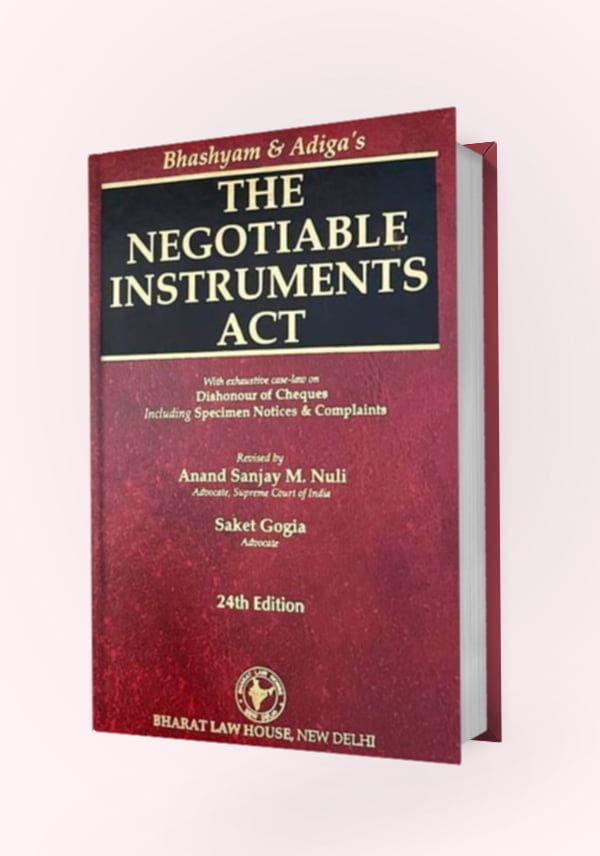
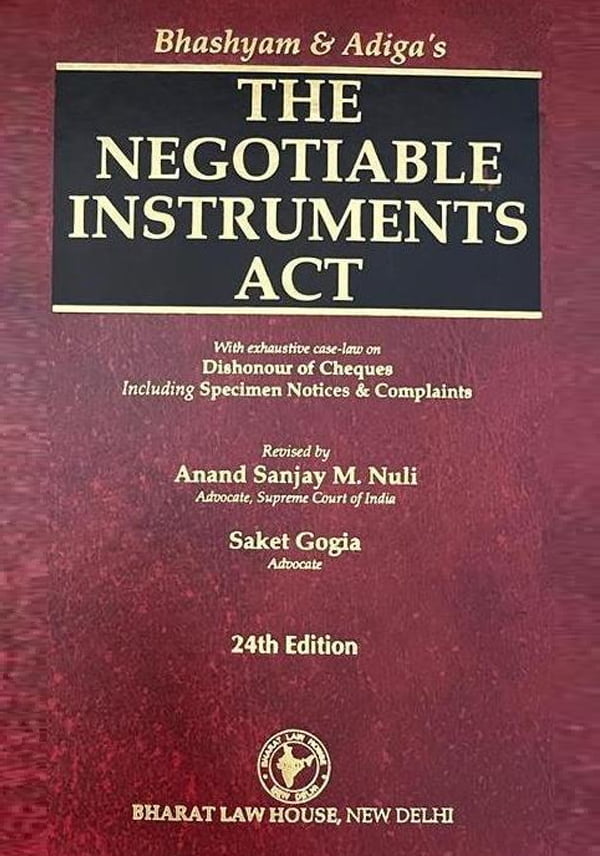

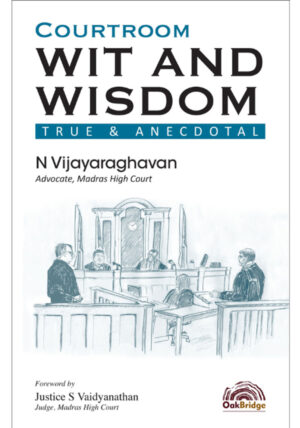
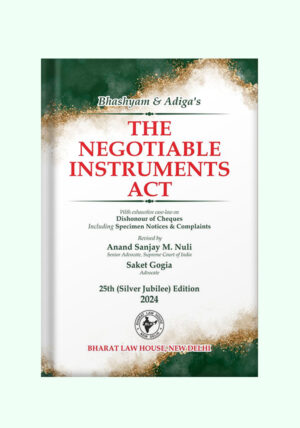
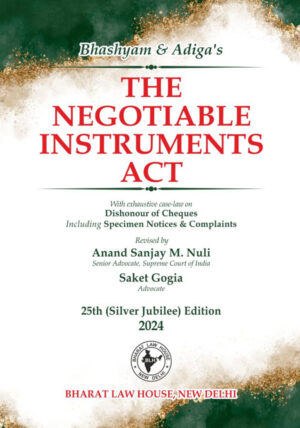
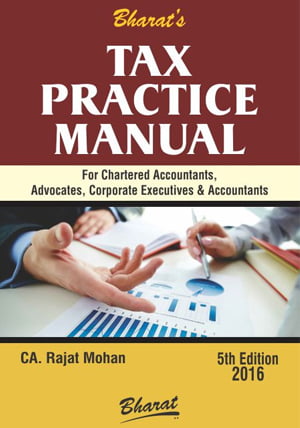
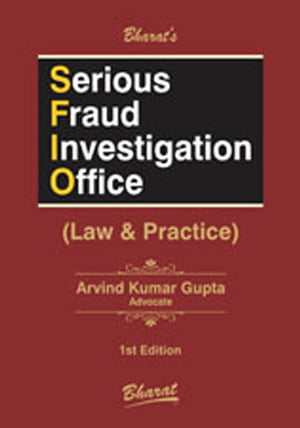




Reviews
There are no reviews yet.